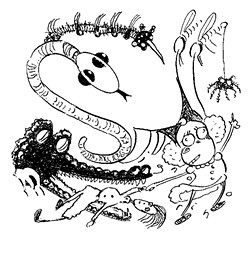
- Slug Signorino
Why are humans so afraid of insects? My first response is to think that insects spoil our food, and a single insect can quickly turn into many, but mice and birds eat our food, too, and mice carry diseases. But almost nobody is afraid of birds, and mice don't inspire nearly the same revulsion that insects do.
—Nathan
I don't know that I'd nominate mice as an exemplar of an unscary stimulus, to be honest—fear of mice is one of the most common fears out there. It's got its own entry as a phobia in the DSM-IV, and in most surveys it's right up there with fears of spiders, snakes, dogs and insects. I'll give you birds, though. Nobody's afraid of birds.
But it is true there's a special weight attached to the fear of bugs, which has received more attention in the scientific literature than mouse phobia has. Plus, there was that Jeff Daniels movie. I'm conflating spiders and insects here, though spiders are of course arachnids; I don't think too many bug-phobes are busy worrying that distinction. In fact, researchers often collapse a whole bunch of critters into a small-animals category that also includes snakes, worms, etc., being less interested in creature-specific fear than in what motivates powerful fear responses in general.
So why bugs? Some say, maybe unsurprisingly, that it's evolution: There might just be things humans are genetically predisposed to fear because they once presented us with a distinct mortal threat. Spiders, for instance: "Humans were at perennial, unpredictable and significant risk of encountering highly venomous spiders in their ancestral environments," Joshua New, a professor of psychology at Barnard, told the Sunday Times in 2014. Eventually, the idea goes, awareness of that risk crept into our DNA.
New was coauthor of a study that year suggesting that humans retain a special ability to quickly identify spiders in our visual field. Subjects answered questions about images they'd seen flashed on a computer screen, which included depictions of spiders, flies and hypodermic needles as well as abstract shapes. The subjects recalled seeing the spiders better than anything else, having evolved—the authors surmised—the need to detect spiders' presence tout suite.
Tests on young children have also lent credence to the idea that there are some fears people are inherently inclined toward. One 2008 paper, for instance, reported that infants associated footage of snakes with audio of a frightened-sounding voice. Similarly, you'll see it argued that a famous depth-perception experiment from the 1960s called the "visual cliff"—in which human babies and young animals must decide whether it's safe to crawl onto a solid but transparent plank suspended above the floor—demonstrates an innate fear of falling in species that don't fly or swim.
As always with evolutionary psychology, not everyone's buying it. Some might point to a quirky study structured roughly like New's, only here the subjects were first screened with two tests: one gauging fear of spiders, the other measuring in-depth familiarity with the British sci-fi show Doctor Who. (Like I said, quirky.) They were then asked to find a picture of a horse in a grid of other images, including spider photos and Doctor Who stills, and guess what? Relative to the control group, both Doctor Who fans and arachnophobes were slower to find the horse, suggesting that we're simply more apt to notice (and thus be distracted by) things we're already interested in. If you fear spiders for whatever reason, you'll be more attuned to them; it doesn't need to be genetic.
Critics also see the evolutionary theory as too convenient: After the fact, "it is quite easy to create a plausible-looking adaptive scenario for a phobia to almost any stimulus," in the words of one researcher. Plus, why would people specifically fear small dangerous animals like spiders and snakes, but not larger, predatory animals that also have the potential to do lethal damage—lions, tigers and bears? And why do so many people fear cockroaches, which are practically harmless?
Another theory, then, is the disease-avoidance model, which suggests that our responses don't stem from a fear of violent harm but from what researchers have called "the food-rejection response of disgust"; why we fear insects more viscerally than we fear lions, in short, is that (as you suggest) insects are the sort of thing that would mess up our food. A 1997 paper examining fears of various animals among subjects in seven countries found a great deal of cross-cultural consistency in the way people responded to the animals in the "disgust-relevant" category—unclean-seeming critters like cockroaches, spiders, worms, leeches, bats, lizards and rats.
This is all far from settled, clearly. The answer is that nobody really knows where primal fears come from, and there's some evidence suggesting they can be learned. Not very satisfying, I know, but hey, it's nature vs. nurture again! Just a few more millennia of back and forth and we'll have this very debate encoded in our DNA.
Send questions to Cecil via StraightDope.com or write him c/o Chicago Reader, 350 N. Orleans, Chicago 60654.